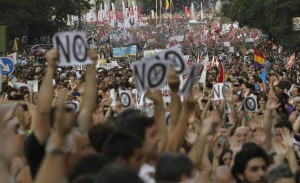
They call it operación retorno: hundreds of thousands of Spaniards get into their cars at the end of their holidays and drive back to their towns and cities to resume their lives. This year, like most, it has seen endless queues of overheated cars fill Spain’s roads on the last weekend of August, peopled by families dreading the return to the office or school.
Just eight months into his tenure and with a handsome majority in Congress, Mariano Rajoy should be bounding back to work with a springier step than most. But instead, the prime minister could be forgiven for wishing he were in one of those sweaty, late-summer traffic jams.
Rajoy’s honeymoon period finished months ago, if indeed he ever enjoyed such a thing. The austerity campaign he launched on taking power in December has steadily eroded his popularity and that of his government. Electoral promises have been repeatedly broken, most notoriously by raising taxes; unemployment is at 25 percent and rising, despite a controversial labour reform; spending cuts are extending a double-dip recession; and an EU bailout of up to €100 billion for the financial sector has been requested, but still not received.
And the next few weeks will be every bit as challenging as the last few months for the Partido Popular (PP) government.
The exact terms of the banking bailout must be hammered out, as must the way in which the funds will be administered. But more importantly, there is the prospect of another bailout, this time for the Spanish economy as a whole. This would see Spain requesting help from the EU, and the European Central Bank overseeing the purchase of Spanish sovereign debt to bring down the country’s borrowing costs.
The potential conditions attached to such a deal are still unclear. But having raised VAT (a measure taking effect from September 1), increased income tax, and cut health and education spending, the government has little room for manoeuvre left when it comes to reforms, although the sacrosanct pensions system remains untouched.
In recent weeks Rajoy and his cabinet have repeatedly denied that negotiations for such a bailout are underway. But when he meets with Angela Merkel on September 6, the issue will no doubt be broached. The bond markets, which seemed to be pushing Spain to the brink early in the summer, have calmed down more recently and their behaviour will be key in deciding whether the ECB’s help is needed.
It’s grim up north
A more predictable problem for the government arrives on October 21, when regional elections are held in Galicia and the Basque Country. The end of a mainstream governing partnership between the Socialists and PP brought the Basque ballot forward by four months and it looks almost certain to leave those two parties marginalised.
With the pro-independence izquierda abertzale now allowed to run in elections, they or the more moderate Basque Nationalist Party (PNV) are likely to be in pole position on October 22. Deputy Prime Minister Soraya Sáenz de Santamaría has admitted that the government is “extremely worried” at the prospect of the two nationalist groups teaming up to govern with a separatist agenda.
The Galician election is less politically charged. But if the PP loses power there, as many suspect, the loss of the conservative fiefdom will be seen as a reflection of anger at Rajoy’s nationwide austerity drive. The September 1 VAT hike and the spectre (or fallout) of a sovereign bailout for the Spanish economy will severely hamper the campaign of PP candidate Alberto Feijóo.
But discontent at the central government’s attempts to battle the economic crisis won’t only be apparent in northern Spain. The end of summer marks a resumption of the social unrest that has been simmering consistently almost since this government took power. The UGT and CCOO, the country’s biggest labour unions, have said they are now “permanently” campaigning against Rajoy’s labour reform and austerity policies, and a massive street demonstration is scheduled for September 15. Civil servants, the 15M / indignados movement, students and many others are likely to join that event, but it will be the first of many protests in a season of discontent.
Shoot the messenger
There is little Rajoy can do to stop such displays of contempt for his increasingly unpopular government. But one area he can address is his own administration’s coordination and communication. The contradictions and misunderstandings between ministers that characterised his first eight months in office reached a new nadir in August, with Finance Minister Cristóbal Montoro and Energy Minister José Manuel Soria publicly sparring over energy policy. As one columnist commented, this Spanish government operates “as if it didn’t know the internet existed”.
Rajoy may feel that the economic, political and social problems facing him are vastly more important than how his government gets its message across. But in this day and age, he couldn’t be more mistaken.
Leave a Reply
You must be logged in to post a comment.